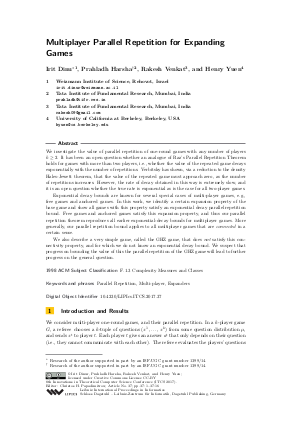Multiplayer Parallel Repetition for Expanding Games
Authors Irit Dinur, Prahladh Harsha, Rakesh Venkat, Henry Yuen
-
Part of:
Volume:
8th Innovations in Theoretical Computer Science Conference (ITCS 2017)
Part of: Series: Leibniz International Proceedings in Informatics (LIPIcs)
Part of: Conference: Innovations in Theoretical Computer Science Conference (ITCS) - License:
 Creative Commons Attribution 3.0 Unported license
Creative Commons Attribution 3.0 Unported license
- Publication Date: 2017-11-28
File

PDF
LIPIcs.ITCS.2017.37.pdf
- Filesize: 0.54 MB
- 16 pages
Document Identifiers
Subject Classification
Keywords
- Parallel Repetition
- Multi-player
- Expander
Metrics
- Access Statistics
-
Total Accesses (updated on a weekly basis)
0PDF Downloads0Metadata Views
Abstract
We investigate the value of parallel repetition of one-round games with any number of players k>=2. It has been an open question whether an analogue of Raz's Parallel Repetition Theorem holds for games with more than two players, i.e., whether the value of the repeated game decays exponentially with the number of repetitions. Verbitsky has shown, via a reduction to the density Hales-Jewett theorem, that the value of the repeated game must approach zero, as the number of repetitions increases. However, the rate of decay obtained in this way is extremely slow, and it is an open question whether the true rate is exponential as is the case for all two-player games. Exponential decay bounds are known for several special cases of multi-player games, e.g., free games and anchored games. In this work, we identify a certain expansion property of the base game and show all games with this property satisfy an exponential decay parallel repetition bound. Free games and anchored games satisfy this expansion property, and thus our parallel repetition theorem reproduces all earlier exponential-decay bounds for multiplayer games. More generally, our parallel repetition bound applies to all multiplayer games that are *connected* in a certain sense. We also describe a very simple game, called the GHZ game, that does not satisfy this connectivity property, and for which we do not know an exponential decay bound. We suspect that progress on bounding the value of this the parallel repetition of the GHZ game will lead to further progress on the general question.
Cite As Get BibTex
Irit Dinur, Prahladh Harsha, Rakesh Venkat, and Henry Yuen. Multiplayer Parallel Repetition for Expanding Games. In 8th Innovations in Theoretical Computer Science Conference (ITCS 2017). Leibniz International Proceedings in Informatics (LIPIcs), Volume 67, pp. 37:1-37:16, Schloss Dagstuhl – Leibniz-Zentrum für Informatik (2017)
https://doi.org/10.4230/LIPIcs.ITCS.2017.37
BibTex
@InProceedings{dinur_et_al:LIPIcs.ITCS.2017.37,
author = {Dinur, Irit and Harsha, Prahladh and Venkat, Rakesh and Yuen, Henry},
title = {{Multiplayer Parallel Repetition for Expanding Games}},
booktitle = {8th Innovations in Theoretical Computer Science Conference (ITCS 2017)},
pages = {37:1--37:16},
series = {Leibniz International Proceedings in Informatics (LIPIcs)},
ISBN = {978-3-95977-029-3},
ISSN = {1868-8969},
year = {2017},
volume = {67},
editor = {Papadimitriou, Christos H.},
publisher = {Schloss Dagstuhl -- Leibniz-Zentrum f{\"u}r Informatik},
address = {Dagstuhl, Germany},
URL = {https://drops.dagstuhl.de/entities/document/10.4230/LIPIcs.ITCS.2017.37},
URN = {urn:nbn:de:0030-drops-81575},
doi = {10.4230/LIPIcs.ITCS.2017.37},
annote = {Keywords: Parallel Repetition, Multi-player, Expander}
}
Author Details
References
- Mohammad Bavarian, Thomas Vidick, and Henry Yuen. Anchoring games for parallel repetition. (manuscript), 2015. URL: http://arxiv.org/abs/1509.07466.
- Mohammad Bavarian, Thomas Vidick, and Henry Yuen. Parallel repetition via fortification: analytic view and the quantum case. (manuscript), 2016. URL: http://arxiv.org/abs/1603.05349.
- Mark Braverman and Ankit Garg. Small value parallel repetition for general games. In Proc. 47th ACM Symp. on Theory of Computing (STOC), pages 335-340, 2015. URL: http://dx.doi.org/10.1145/2746539.2746565.
- Kai-Min Chung, Xiaodi Wu, and Henry Yuen. Parallel repetition for entangled k-player games via fast quantum search. In Proc. 30th Comput. Complexity Conf., pages 512-536, 2015. http://arxiv.org/abs/1501.00033, URL: http://dx.doi.org/10.4230/LIPIcs.CCC.2015.512.
- Persi Diaconis and Daniel Stroock. Geometric bounds for eigenvalues of Markov chains. Ann. Appl. Probab., 1(1):36-61, 1991. URL: http://dx.doi.org/10.1214/aoap/1177005980.
- Daniel M. Greenberger, Michael A. Horne, Abner Shimony, and Anton Zeilinger. Bell’s theorem without inequalities. Am. J. Phys., 58(12):1131-1143, 1990. URL: http://dx.doi.org/10.1119/1.16243.
- Venkatesan Guruswami. Rapidly mixing Markov chains: a comparison of techniques. (survey), 2016. URL: http://arxiv.org/abs/1603.01512.
- Thomas Holenstein. Parallel repetition: Simplification and the no-signaling case. Theory Comput., 5(1):141-172, 2009. (Preliminary version in 39th STOC, 2007). http://arxiv.org/abs/cs/0607139, URL: http://dx.doi.org/10.4086/toc.2009.v005a008.
- Dana Moshkovitz. Parallel repetition from fortification. In Proc. 55th IEEE Symp. on Foundations of Comp. Science (FOCS), pages 414-423, 2014. URL: http://dx.doi.org/10.1109/FOCS.2014.51.
- D. H. J. Polymath. A new proof of the density Hales-Jewett theorem. Ann. of Math., 175:1283-1327, 2012. http://arxiv.org/abs/0910.3926, URL: http://dx.doi.org/10.4007/annals.2012.175.3.6.
- Ran Raz. A parallel repetition theorem. SIAM J. Comput., 27(3):763-803, June 1998. (Preliminary version in 27th STOC, 1995). URL: http://dx.doi.org/10.1137/S0097539795280895.
- Alistair Sinclair. Improved bounds for mixing rates of Markov chains and multicommodity flow. Combin. Probab. Comput., 1(4):351-370, 1992. (Preliminary version in 1st LATIN, 1992). URL: http://dx.doi.org/10.1017/S0963548300000390.
- Oleg Verbitsky. Towards the parallel repetition conjecture. Theoret. Comput. Sci., 157(2):277-282, 1996. (Preliminary version in 9th Structure in Complexity Theory Conference, 1994). URL: http://dx.doi.org/10.1016/0304-3975(95)00165-4.
